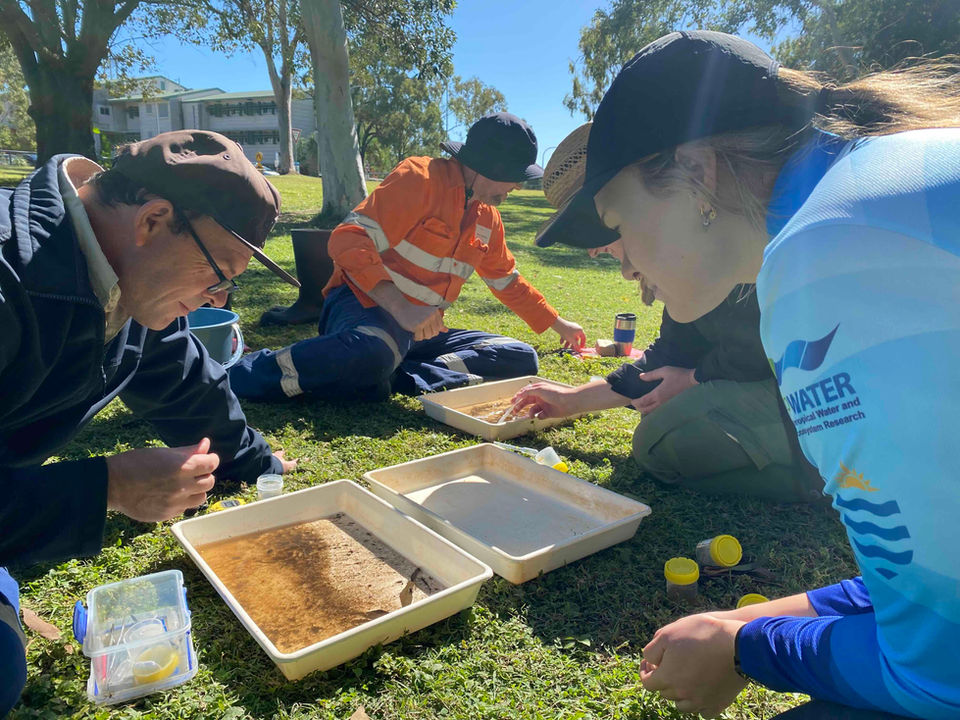Celebrating the work of women in science
Each year, we celebrate the International Day of Women and Girls in Science (11 February) to acknowledge the contributions of the many women monitoring, researching, restoring, and protecting tropical ecosystems.
We asked seven TropWATER researchers about their experiences – what led them to working in science, what they love about their job, and some of the challenges they’ve faced.

What is blue carbon?
Marine and coastal ecosystems are very efficient at capturing carbon – this is called blue carbon. Mangroves, saltmarshes, seagrass meadows, and coastal wetlands all capture and store blue carbon, contributing to mitigating climate change. But if these ecosystems are destroyed, this carbon is released – and no more is captured.
Our researchers are trialling restoration methods for a range of coastal habitats, assessing the health of these ecosystems after extreme climate events, and setting new standards for how blue carbon is measured.

Sustainable water security in northern Australia
Northern Australia boasts vast land areas, ample rainfall, and abundant water resources, making it a favourable region for agricultural expansion and developing water security. But expansion could pose a significant threat to the region's biodiverse aquatic ecosystems, disrupting water quality and the natural flow essential to ecosystems in both wet and dry seasons.
Our researchers are exploring how to maximise water resource allocation across the vast and diverse landscapes of Northern Australia, advising policymakers on potential impacts to ecosystems.

Assessing the impacts of flooding after Tropical Cyclone Jasper
Tropical Cyclone Jasper made landfall in Far North Queensland in December 2023, bringing record-breaking rainfall to the region and causing widespread flooding that washed sediments across coastal habitats. The affected region included part of the Wet Tropics of Queensland and Great Barrier Reef World Heritage areas.
We partnered with Rangers to survey coastal habitats in 2024 and 2025 and assess the impacts of the flooding on mangrove forests, inshore coral reefs, and seagrass meadows.

19 March: Shaping sea turtle conservation strategies in a changing world
WEBINAR: 1-2pm AEST Thursday 19 March
Increasing temperatures, rising seas, and coastal development are just some of the threats currently facing sea turtles worldwide. Conservation efforts need to be carefully targeted to effectively address these challenges – matching the best approach with the right location to boost turtle survival and resilience.
Join us to hear from Dr Emily Webster and Dr Caitlin Smith about their latest work guiding science-based strategies for effective sea turtle conservation and supporting Indigenous-led management of turtles on Sea Country in Queensland. From the nest to adulthood, this work is providing valuable data needed for informed conservation decisions.
View more details below and sign up to hear about upcoming webinars.

Our eDNA lab
As northern Australia's leading eDNA experts, we use genetic clues to revolutionise how to detect invasive and threatened species.
We’ve contributed to biosecurity surveillance, environmental impact assessments, tracking fish communities in Australian waterways, locating threatened species, and advancing eDNA science itself, while working with Traditional Owners, community groups, governments, councils and regional bodies. We also lead advances in eDNA techniques and offer commercial and research services.

Our research and projects
We provide industries, communities and governments with science-based solutions to better manage, protect and restore our tropical water ecosystems. Explore our research and projects.
News
Our services and capabilities
We provide science-based solutions, stakeholder training, and innovative monitoring technologies. Our capabilities include water quality and eDNA labs, specialised training programs, technology development, and a range of environmental assessments and restoration efforts.











.webp)















